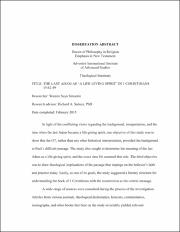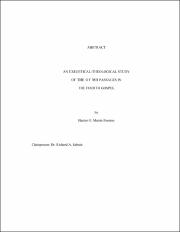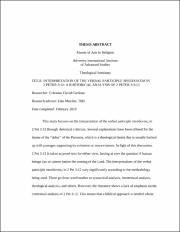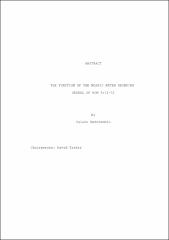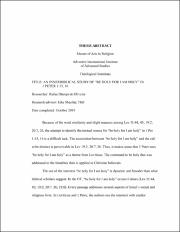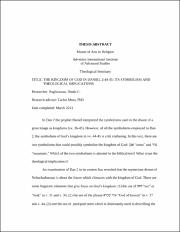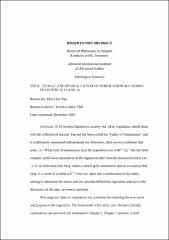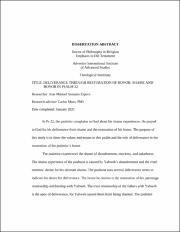Search
Now showing items 21-30 of 54
The Last Adam as "a life-giving spirit" in 1 Corinthians 15:42-49
(Adventist International Institute of Advanced Studies, 2015-02)
In light of the conflicting views regarding the background, interpretation, and the
time when the last Adam became a life-giving spirit, one objective of this study was to
show that the OT, rather than any other historical ...
An exegetical-theological study of the OY MH passages in the fourth gospel
(Adventist International Institute of Advanced Studies, 2012-02)
Although grammarians have noted the phenomenon of the emphatic denial ouj mh; (ED) in the Fourth Gospel, a survey of the standard critical commentaries on the Gospel of John reveals that there is scanty work about its ...
The Meaning of Jesus' EPXOMAI 'coming' statements in Revelation 2 and 3
(Adventist International Institute of Advanced Studies, 2014-09)
Scholars are divided as to whether Christ's tpyopa{ statements in Rev 2:5,16. and,
3:11 refer to personal judgments, or to Christ's literal second advent at the end of the
eschaton. For {pyopa( to represent personal ...
Skia Ton Mellonton in Col 2:17 : an interpretation
(Adventist International Institute of Advanced Studies, 2009-06)
This study explores the meaning of Skia Ton Mellonton“a
shadow of things that were to come” within the calendric
text of Col 2:16,17. The grammatical and syntactical
difficulties in this passage have generated interest ...
Interpretation of the verbal participle Speudontas in 2 Peter 3:12 : a rhetorical analysis of 2 Peter 3:3-13
(Adventist International Institute of Advanced Studies, 2018-03)
This study focuses on the interpretation of the verbal participle σπεύδοντας in 2 Pet 3:12 through rhetorical criticism. Several explanations have been offered for the theme of the “delay” of the Parousia, which is a ...
The Function of the Mosaic water drinking ordeal of Num 5:11-31
(Adventist International Institute of Advanced Studies, 2010-06)
pertaining to its origin, composition,
nature, and purpose. The current study deals with the last
issue, that is, the purpose of the ordeal of Num 5:11-31.
The study addresses the issue through the cognitive social
function ...
An Innerbiblical study of "be holy for I am holy" in 1 Peter 1:15,16
(Adventist International Institute of Advanced Studies, 2019-10)
Because of the word similarity and slight nuances among Lev 11:44, 45; 19:2; 20:7, 26, the attempt to identify the textual source for “be holy for I am holy” in 1 Pet 1:15, 16 is a difficult task. The association between ...
The kingdom of God in Daniel 2:44-45 : its symbolism and theological implications
(Adventist International Institute of Advanced Studies, 2013-03)
In Dan 2 the prophet Daniel interpreted the symbolisms used in the dream of a great image as kingdoms (vv. 36-45). However, of all the symbolisms employed in Dan 2, the symbolism of God’s kingdom in vv. 44-45 is a bit ...
Tsaraat and its regulation of purification according to Leviticus 13 and 14
(Adventist International Institute of Advanced Studies, 2019-12)
Leviticus 13-14 record a legislation, namely, the צָרַעַת regulation, which deals with the affliction of tsaraat. Tsaraat has been called the “Father of Uncleanness” and is traditionally associated with personal sin. ...
Deliverance through restoration of honor : shame and honor in Psalm 22
(Adventist International Institute of Advanced Studies, 2021-01)
In Ps 22, the psalmist complains to God about his shame experiences. He prayed to God for his deliverance from shame and the restoration of his honor. The purpose of this study is to show the values and means in this psalm ...

